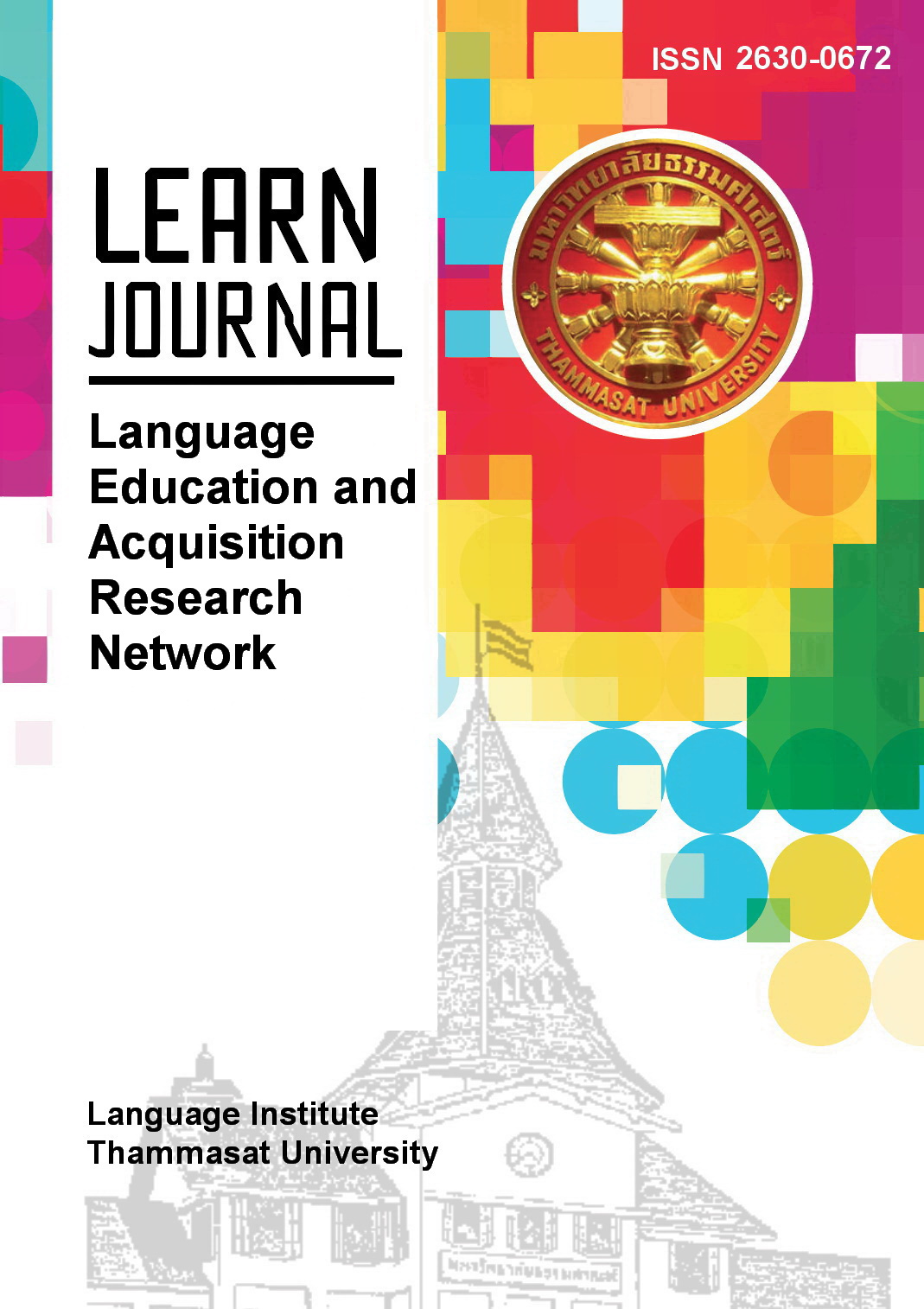Do Two Nonword Types Bring About Different YN Vocabulary Test Results?
Main Article Content
Abstract
The YN vocabulary test (YN test) is a vocabulary size test that presents test takers with a list of words and asks them to answer yes to the words they know. This test may include nonwords, i.e., imaginary words added to the test to check for guessing. However, there have been no conclusive guidelines about nonword construction. One way of creating a nonword is to change one or two letters from the original word such as dactor from doctor. This approach suggests one important question: To what extent should nonwords be different from their original words? This study, therefore, aims to compare 2 nonword types: one type which is phonologically similar to real words (N1) and the other which is less similar (N2) in order to check whether they lead to different YN test results. An example of N1 would be willage, which is how some Thai speakers pronounce village while N2 would be cillage. Two YN test types (N1 and N2 tests) were administered to 600 university students, followed by translation tests and semi-structured interviews. The results suggest that N1 tests tend to be better in predicting the actual vocabulary size of the participants than N2.
Article Details
References
Anderson, R. C., & Freebody, P. (1983). Reading comprehension and the assessment and acquisition of word knowledge. In B. Huxton (Ed.), Advances in Reading/Language Research (pp. 231-256). Greenwich, JAI Press.
Barrow, J., Nakanishi, Y., & Ishino, H. (1999). Assessing Japanese college students’ vocabulary knowledge with a self-checking familiarity survey. System, 27(2), 223-247. http://doi:10.1016/S0346-251X(99)00018-4
Beeckmans, R., Eyckmans, J., Janssens, V., Dufranne, M., & Van de Velde, H. (2001). Examining the YN vocabulary test: some methodological issues in theory and practice. Language Testing, 18, 235-274.
Cobb, T. (2000). One size fits all? Francophone learners and English vocabulary tests. Canadian Modern Language Review, 57(2), 295-324.
Durso, F. T., & Shore, W. J. (1991). Partial knowledge of word meanings. Journal of Experimental Psychology: General, 120, 190-202.
Eyckmans, J. (2004). Measuring receptive vocabulary size. Unpublished Doctoral Dissertation. LOT.
Eyckmans, J., Van de Velde, H., van Hout, R., & Boers, F. (2007). Learners’ response behaviour in YN vocabulary tests. In H. Daller, J. Milton and J. Treffers-Daller (Eds.), Modelling and assessing vocabulary knowledge (pp. 59-76). Cambridge University Press.
Harrington, M. & Carey, M. (2009). The on-line YN test as a placement tool. System, 37, 614-626.
Laufer, B. (1997). The lexical plight in second language reading: Words you don't know, words you think you know, and words you can't guess. In J. Coady and T. Huckin (Eds.), Second language vocabulary acquisition (pp. 20-34). Cambridge University Press.
Meara, P., & Buxton, B. (1987). An alternative to multiple choice vocabulary tests. Language Testing, 4, 142-151.
Mochida, K., & Harrington, M. (2006). The YN test as a measure of receptive vocabulary knowledge. Language Testing, 23(1), 73–98.
Nation, I. S. P. (2001). Learning vocabulary in another language. Cambridge University Press.
Nation, I. S. P. (2004). A study of the most frequent word families in the British National Corpus. In P. Bogaards & B. Laufer (Eds.), Vocabulary in a second language: Selection, acquisition, and testing (pp. 3-13). John Benjamins.
Nation, I. S. P., & Hwang, K. (1995). Where would general service vocabulary stop and special purposes vocabulary begin? System, 23: 35-41.
Nunnally, J. C. (1978). Psychometric theory (2nd ed.). McGraw-Hill.
Pellicer-Sánchez, A., & Schmitt, N. (2012). Scoring Yes–No vocabulary tests: Reaction time vs. nonword approaches. Language Testing, 29(4), 489–509. https://doi.org/10.1177/0265532212438053
Qian, D. D. (2002). Investigating the relationship between vocabulary knowledge and academic reading performance: An assessment perspective. Language Learning, 52(3), 513–536.
Read, J. (2000). Assessing vocabulary. Cambridge University Press.
Read, J. (2007). Second language vocabulary assessment: Current practices and new directions. International Journal of English Studies, 7, 105-125.
Roche, T. & Harrington, M. (2013). Recognition vocabulary knowledge as a predictor of academic performance. Language Testing in Asia, 3(12), 1-13.
Ryan, A. & Meara, P. (1991) The case of the invisible vowels: Arabic speakers reading English words. Reading in a Foreign Language, 7(2), 531-540.
Stewart, J. (2014). Do multiple-choice options inflate estimates of vocabulary size on the VST? Language Assessment Quarterly, 11(3), 271–282.
Stubbe, R. (2012). Do pseudoword false alarm rates and overestimation rates in yes–no vocabulary tests change with Japanese university students’ ability levels? Language Testing, 29(4), 471–488.
Thoma, D. (2011). Strategic attention in language testing: Metacognition in a YN business English vocabulary test. Peter Lang.
Ward, J. W. (2005). The lexical aspect of reading English as a foreign language for engineering undergraduates [Ph.D. thesis]. The University of Birmingham, U.K.
Wongkositkul, A. (1993). A comparison of English and Thai phonological systems for teaching Thai to foreigners. Journal of Language and Culture, 12(1), 86–93. (in Thai).
Zhang, X., Liu, J., & AI, H. (2020). Pseudowords and guessing in the YN format vocabulary test. Language Testing, 37(1), 6–30.
http://doi: 10.1177/0265532219862265


